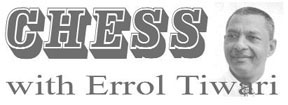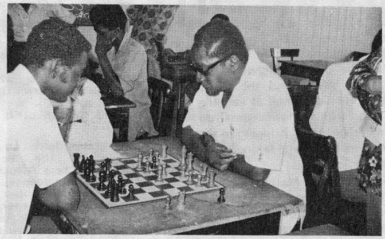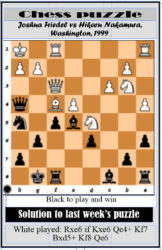There was a promising time in Guyana following the creation of the chess association in the early 1970s, when the nation benefited from men who demonstrated commitment to the game, integrity, and polish. In conversation, people sometimes dispute those acclaims saying “it ain’t true,” to the disappointment of the column.

As the Soviet Union was depicting at the time, Burnham wanted to take chess to the masses. He succeeded, as well as the country’s scarce resources would have permitted.
If we should ever create a mould for recognition in local chess, it should be one of Forbes Burnham. He introduced the ancient Indian game to the nation in a structured manner, placed Guyana ahead of its English-speaking Caribbean competitors statistically, sensationalized the game through statecraft and meaningful socializing, engineered grandmaster visits, organized chess trainers on loan, and much more.

In the 1970s and 80s, pre-eminent Guyanese chess players enjoyed the status of national celebrities. At the 1975 Caribbean Chess Championships, the nation’s local participants for the tournament were accommodated at the Pegasus, similar to their foreign counterparts. There were no disparities. In those years, chess flourished in small clubs. We even had a few inter-club championships organized by the GCF. It was a time of relish. It was a time of promise.
The column subscribes to the idea that Burnham did not perceive chess as an esoteric talent without much relevance in the real world, as some other people do. The byzantine world of competitive chess made it a tough sell as a spectator sport then, and now.
And yet Burnham, at the time, believed there was a place for brilliant minds to achieve meaningfully.
Today, with some 600 million people purposely engaged in chess (based on a study conducted by YOU-gov, an established polling firm) and amid increasing numbers, it seems Burnham was accurate.
Three names have been mentioned so far in our quest to identify a new president of the GCF. If we take the incumbent into consideration, and we should, there would be four persons. The current presidency will undoubtedly aim to capture the significance of our past. We have to reclaim the intellectual curiosity, prowess and tenacity that we lost. The task at hand would be enormous.
With a population of under one million, chess in the past has prospered locally. In the US, with a population of 318 million, there was some difficulty identifying three internationally competitive players, recently, from within the world’s elite. We need a president, therefore, who can at least reward us with a grandmaster from within our midst. We have fallen behind while the larger Caribbean has put us in check. We have to get out.
Quite suddenly, there has been a renewed interest in the obscure chess organization. What could be responsible for this development? Not so long ago, no one seemed to care about chess. Now, however, things seems to be looking up, starting with the candidacy for president of the GCF.
Chess games
Hikaru Nakamura defeated world chess champion Magnus Carlsen at the Grand Chess Tour blitz tournament in Paris last week. The American grandmaster surpassed an elite field which included Kramnik, Caruana, Giri, Aronian among others.
Black: Veselin Topalov
- d4 Nf6 2. c4 e6 3. Nc3 Bb4 4. e3 O-O 5. Ne2 d5 6. a3 Bd6 7. cxd5 exd5 8. Ng3 Re8 9. Bd3 c5 10. dxc5 Bxc5 11. O-O Nc6 12. b4 Bb6 13. Nce2 d4 14. e4 Ne5 15. Bf4 Nfg4 16. h3 Nxd3 17. Qxd3 Ne5 18. Bxe5 Rxe5 19. f4 Re8 20. f5 Bd7 21. Kh1 Rc8 22. Rf4 Qg5 23. Rg4 Qe3 24. Qxe3 dxe3 25. Nh5 Bb5 26. Rxg7+ Kh8 27. Rxf7 Bxe2 28. Nf6 Rc7 29. Rxc7 Bxc7 30. Nxe8 Bg3 31. e5 Bb5 32. Nd6 Bd3 33. Nxb7 e2 34. e6 Bxf5 35. e7 Bg6 36. b5 Kg8 37. a4 Kf7 38. a5 Bc2 39. Nc5 Kxe7 40. b6 axb6 41. axb6 Kd6 42. Rc1 1-0.
White: Magnus Carlsen
Black: Hikaru Nakamura
- d4 Nf6 2. c4 e6 3. Nc3 Bb4 4. Nf3 O-O 5. Bg5 c5 6. e3 cxd4 7. exd4 d5 8. Rc1 Be7 9. a3 b6 10. Bxf6 Bxf6 11. cxd5 exd5 12. Bb5 a6 13. Ba4 b5 14. Bb3 Re8+ 15. Ne2 Bg4 16. O-O Bxf3 17. gxf3 Ra7 18. Rc5 Rd7 19. Nc3 Rd6 20. Rxd5 Nc6 21. Rxd6
Qxd6 22. Re1 Rxe1+ 23. Qxe1 Qd8 24. d5 Nd4 25. Qd1 g6 26. Kg2 Nf5 27. a4 bxa4 28. Bxa4 Nd6 29. Qd3 Be5 30. Ne4 Qh4 31. h3 Qf4 32. Nxd6 Bxd6 33. Qxa6 Qg5+ 34. Kf1 Qc1+ 35. Kg2 Qg5+ 1/2-1/2.
White: Anish Giri
Black: Hikaru Nakamura
- e4 e5 2. Nf3 Nc6 3. Bb5 Nf6 4. d3 Bc5 5. c3 O-O 6. O-O Re8 7. Bg5 a6 8. Ba4 h6 9. Bh4 b5 10. Bc2 g5 11. Bg3 d6 12. Nbd2 Bb6 13. a4 Rb8 14. axb5 axb5 15. Kh1 Kg7 16. Re1 Nh7 17. Nf1 h5 18. h4 g4 19. N3h2 Ne7 20. d4 Ng6 21. Ne3 Be6 22. Nf5+ Kh8 23. f3 exd4 24. cxd4 Bxf5 25. exf5 Rxe1+ 26. Qxe1 Ngf8 27. fxg4 hxg4 28. Nxg4 Nf6 29. Qd1 Nxg4 30. Qxg4 Qf6 31. Rd1 Nh7 32. Bf2 Qh6 33. Kg1 Rg8 34. Qf3 Nf6 35. Bb3 Rg7 36. Re1 Qd2 37. Qe2 Qf4 38. d5 Ng4 39. Bxb6 Qh2+ 40. Kf1 Qh1+ 41. Bg1 Nh2+ 42. Kf2 Rxg2+ 43. Ke3 Rxe2+ 44. Kxe2 Qf3+ 45. Kd2 Qxb3 46. Bd4+ Kh7 0-1.






